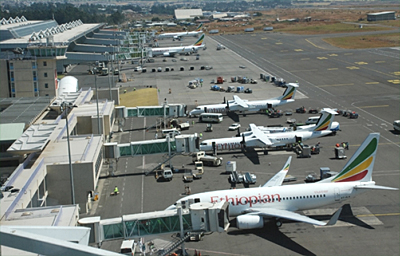Woes of Private Airlines
 By Kaleyesus Bekele, The Reporter
By Kaleyesus Bekele, The Reporter
Addis Ababa, Ethiopia – When Ethiopian Airlines acquired a state-of-the-art jetliner, the Boeing B787-8 Dreamliner in August of 2012, it took many by surprise. How can a poor country like Ethiopia become second next to Japan to own and operate the most sophisticated airliner in the world?
Ethiopian was the first African carrier to join the jet age in the 1960s by bringing the first B720 jetliner to Africa. Again it was the first airline in Africa to acquire the Boeing 767 in 1984. It was also the first carrier in Sub-Saharan Africa to place orders for the Airbus 350XWB in 2009.
The national flag carrier is still renewing its fleet, expanding its international and domestic routes and building its infrastructure tremendously. At a time when the global airline industry is traversing through turbulent times, Ethiopian has been recognized by the International Air Transport Association (IATA) as the largest carrier in Africa. Ethiopian became, for the first time in its 69 year history, the largest African carrier with revenue topping 2.3 billion dollars in 2013 and profit, according to the airlines ranking of the IATA published in the 58th edition of World Air Transport Statistics.
According to IATA’s annual airline ranking published last June, Ethiopian ranks first in Africa and 37th in the world in revenue as well as first in Africa and 18th in the world in operating profit.
Ethiopian Airlines is a global Pan-African carrier currently serving 83 international destinations across 5 continents with over 200 daily departures and operating 66 modern aircrafts such as the B777 and B787. Ethiopian registered this remarkable growth at a time when mega carriers like Qantas and Air France KLM were declaring loss. What makes Ethiopian’s success story unique is that it is a state owned company. One of the reasons often cited for most African airlines’ failure is their state ownership. Ethiopian has disproved this logic.
Though Ethiopian Airlines has a glorious history that started in 1946, the general aviation in the country is at its infant stage. There are 16 foreign airlines that fly to Addis Ababa. However, it is only Ethiopian Airlines that operates scheduled domestic flight services in the country. Foreign airlines are not allowed to operate domestic flight services. Private operators until recently could not operate aircrafts that had more than 20 seats. Recently, the seat limitation was pushed to 50. Domestic flight service is only allowed for Ethiopian nationals. Foreign investors cannot invest in private airlines.



